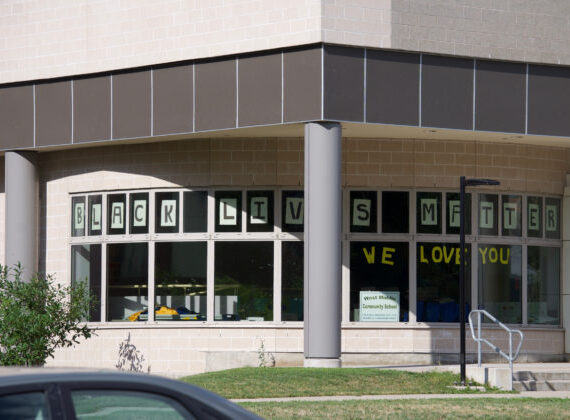Other than the military personnel who are armed to the teeth with coffee and junkfood from Dunkin Donuts, I rarely see significant foot traffic near the Legislative Office Building. Mostly, people drive to the parking garage and enter the building through the pedestrian entrance, never needing to come into contact with sunlight. Yet, there are large, well-marked warnings painted on the driveway, warning motorists to slow down. There are stop signs posted in places that make them more noticeable. There are even neon yellow signs telling motorists to stop for pedestrians — the signs are posted right in the crosswalks. I do appreciate this, as I use the area as a safer passage to downtown, given that the alternative of continuing along Capitol Avenue means having to cross the I-84 on/off ramp. Even with the stoplights all working and with the pedestrian walk signal on, the cars do not stop. Last week I saw a noticeably pregnant woman pushing a stroller across and the cars were not even obeying the law for her. It seems strange that few such safety features exist along a major street, but within a parking lot, traffic is managed quite well.
Sunday morning, when I read about the volunteer crossing guard who was threatened with arrest for keeping children safe, my heart sank. I read the article a few more times, trying to find a hidden clue that would make this story make sense. In a nutshell, a grandfather, who happens to be a disabled Vietnam Vet, decided to contribute to society by helping children safely get across the street to the Achievement First Academy in the Blue Hills neighborhood. He began this back in September. He had been honored by the school in the school newsletter and by being given a vest and stop sign. That sounds like his actions had been more than merely approved of by those he was interacting with directly.
Why threaten a man with arrest for helping society? The article explains:
Jay Mihalko, the school’s dean of students, also intervened when a few parents complained about what Vail was doing or got into disagreements with him.
Little imagination is needed to read between the lines on this one. Who would be angry about what a crossing guard was doing? My guess, from what I have witnessed in several school zones, is that self-centered people who are either in a rush, completely apathetic about safety, or both, got annoyed because someone dared to tell them (or signal to them) to change their reckless behavior. I have heard that on a street near me, the crossing guard at one end is a bit lax, and sometimes will not argue with drivers to not enter (it becomes a one-way street during arrival and departure hours); they are greeted by a guard down the block who is more hardcore about following rules, who will refuse to let them continue on the wrong way. Again, it takes little imagination to hear the whining that must have been going on to trigger an intervention by the law. It probably sounds something like this: “There’s this rude man who made me stop. I was already late for work/hair appointment/going to the gym and he had no right to hold me up like that. None of the other guards do this. I want him fired.” Throw a few expletives in. If it were not a weak school official and weak police department caving in to the bullying by a group of loudmouthed parents, then what cause existed? The article indicates that Raymond Vail, the unpaid crossing guard, had been previously applauded for his efforts by the school and the police. Why so fickle?
Here are my observations:
Are lawmakers’ lives more valuable than children’s lives? Are frantic parents with the inability to manage their time and leave early for work/whatever more important than enforcing common sense rules? Will we let our fear of lawsuits interfere with our will to do what is right?
Suggestion: leave Vail alone. Use law enforcement to go after people who are creating clear safety hazards, like those who speed through school zones, ride dirtbikes down sidewalks, and fail to stop at red lights.


Mat
I don’t know this to be true, but city crossing guards are unionized, and unions usually don’t like it when someone does their job for free. See, e.g., http://biggovernment.com/libertychick/2010/02/11/union-bosses-target-86-yr-old-volunteer-crossing-guard/
Kerri Provost
Mat,
You know, as I tried to come up with some legitimate reason for Vail to be asked to stop, the only thought I had that fit this category was exactly the point your are making. My understanding, though, is that parents made the complaints, and not the crossing guards or their union. I doubt the kvetching parents were concerned about whether or not a volunteer was messing anything up for the paid guards.
Josh
In my previous work as a community organizer this issue (school crossing safety) came up repeatedly. I found all the crossing guards to be completely welcoming to any assistance offered to them by anyone to help them get the job done. Their union seems to be much more preoccupied with management/staff issues and chronic understaffing than with people doing their work for free.
Richard
Well here is one for you. My partner Tim always walks to work downtown using Capitol Ave. and crosses from the Supreme Court side to the Capitol. Both of us do not trust any drivers, rather be safe than sorry, so we always push the walk button and wait. He did so around 8 AM two weeks ago. Walk light on he proceeded to cross. Well low and behold who come barreling through a clearly marked red light and walk light but Edith Prauge. Almost hit him. That crossing he tells me is a very dangerous one. I guess some drivers don’t know a red light or a cross light. Times like that I wish I had a bazooka.
I told him he should have called the Capitol police, the state police and anyone else and filed a complaint against her. Maybe she needs her eyes tested (for everyones saftey,) maybe she was in a rush, maybe she doesn’t stop for nobody. After all she is Ms. Important now isn’t she and a workers life, oh well.
But the “oh I don’t want to cause trouble for her she does so many good things for all of us, the she is more important than others, we are glad we have her up there on the hill, I stopped on time and wasn’t hurt took over him.” She can be glad it wasn’t me that she almost sent on to my reward that AM, as I do not suffer criminal drivers lightly.